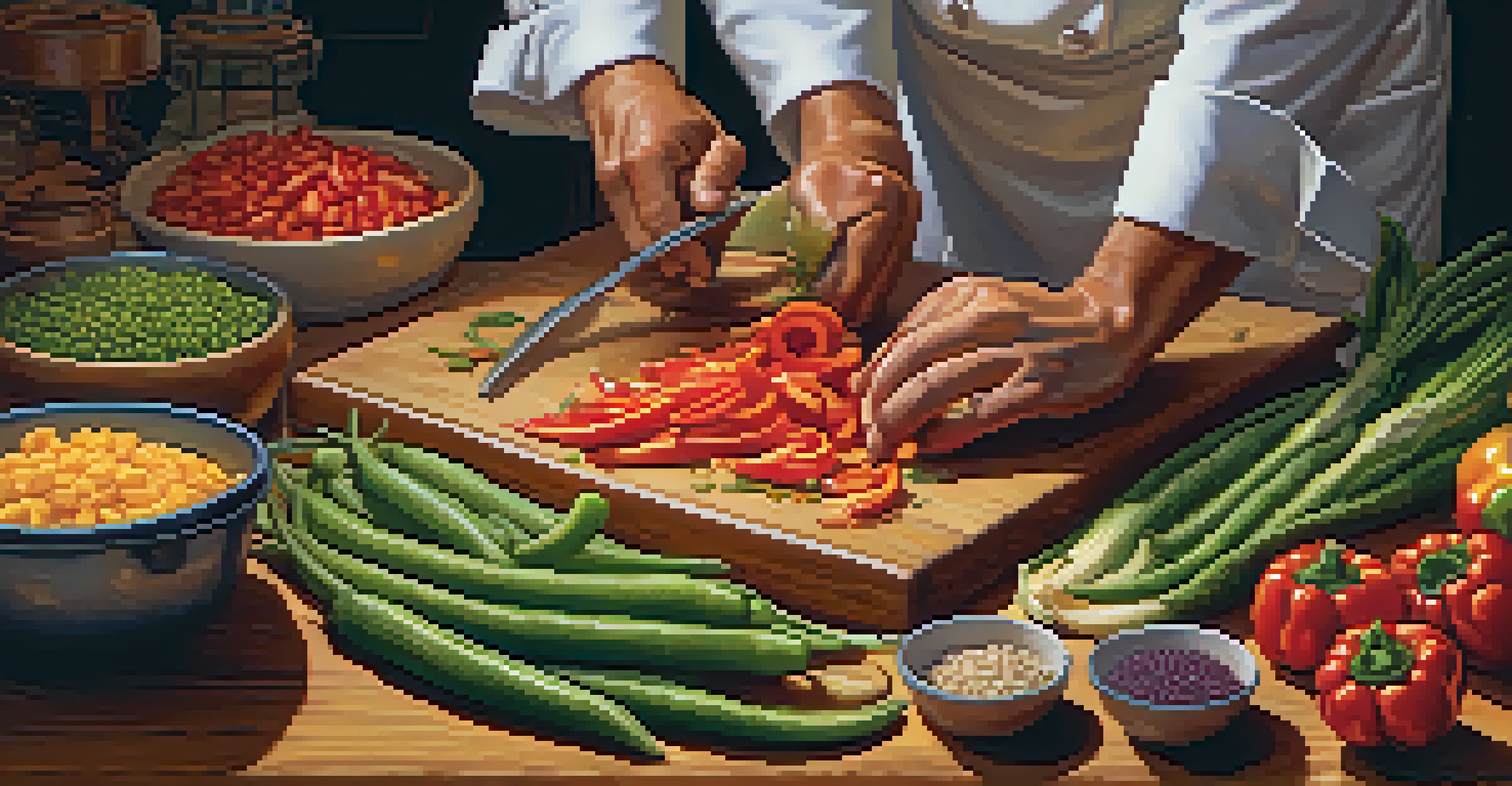Texas Soul Food: The Heart and Soul of Southern Cooking

What is Texas Soul Food? A Flavorful Introduction
Texas soul food is a vibrant blend of culinary traditions, deeply rooted in the Southern experience. It's more than just a meal; it's a celebration of culture, community, and history. This cuisine showcases the rich tapestry of influences from African, Mexican, and Native American cooking.
Food is our common ground, a universal experience.
Imagine the aroma of slow-cooked collard greens simmering with smoked turkey, or the warmth of cornbread fresh from the oven. Each dish tells a story, reflecting the soulful spirit of Texas and its people. It's these hearty, comforting meals that bring families and friends together around the table.
At its core, Texas soul food honors the past while embracing the present. It invites everyone to savor the flavors that have shaped generations, making each bite a delicious journey through time.
The Roots of Texas Soul Food: A Historical Perspective
The history of Texas soul food is intertwined with the struggles and triumphs of African Americans in the South. It originated from the necessity of making nutritious meals from limited resources, often using ingredients that were readily available. This resilience gave rise to beloved dishes that are now staples in kitchens across Texas.

As African American communities settled in Texas, they brought their culinary traditions with them, blending them with local ingredients and flavors. This fusion created unique dishes that reflect the region's diverse heritage, from spicy gumbo to savory tamales. Each bite is a testament to the creativity born out of hardship.
Texas Soul Food Celebrates Culture
This cuisine is a rich blend of African, Mexican, and Native American influences, embodying a vibrant community spirit.
Understanding this historical context adds depth to the appreciation of Texas soul food. It’s a cuisine that embodies survival, creativity, and joy, celebrating the flavors that have stood the test of time.
Key Ingredients That Define Texas Soul Food
Certain ingredients are at the heart of Texas soul food, creating its distinctive flavors. Staples like black-eyed peas, okra, and corn are often featured in many classic dishes. These ingredients not only offer great taste but also symbolize the agricultural heritage of the region.
Cooking is like love. It should be entered into with abandon or not at all.
Meats play a crucial role too, with smoked brisket, fried chicken, and pork chops frequently gracing the table. These proteins are often seasoned generously, marinated, or slow-cooked to perfection, enhancing their flavors. The use of spices, such as cayenne and paprika, adds that signature kick that soul food is known for.
Moreover, the importance of fresh vegetables cannot be overlooked. From sautéed greens to roasted sweet potatoes, these veggies not only enrich the dishes but also provide a healthy balance to the hearty meals. Together, these ingredients create a symphony of flavors that characterize Texas soul food.
Classic Dishes: A Taste of Texas Soul Food
When you think of Texas soul food, certain iconic dishes come to mind. Fried chicken, with its crispy skin and juicy meat, often tops the list as a family favorite. Paired with creamy mashed potatoes and rich gravy, it’s a meal that evokes comfort and nostalgia.
Another beloved dish is chicken-fried steak, a Texas classic that combines the heartiness of a steak with the familiarity of fried food. Smothered in white gravy, it's a dish that embodies the soul of Southern cooking. Each bite is a delightful reminder of home-cooked meals and family gatherings.
Historical Roots of Resilience
Texas soul food emerged from the necessity of creating nutritious meals from limited resources, reflecting the creativity and survival of African American communities.
Don’t forget about sides like cornbread and collard greens, which elevate any meal to a feast. These dishes complement the main courses beautifully while adding their own unique flavors. Together, they create a dining experience that’s truly unforgettable.
The Role of Community in Texas Soul Food Culture
Community plays a vital role in the Texas soul food experience. Whether it's a family gathering or a neighborhood potluck, these meals are often shared, bringing people together. The act of cooking and sharing food fosters connection and strengthens bonds within communities.
In many Texas towns, soul food restaurants serve as gathering places where stories are exchanged and memories are made. These establishments often have a rich history, with recipes passed down through generations. They not only nourish the body but also feed the spirit of community.
Celebrations, such as barbecues and family reunions, often feature soul food as a centerpiece. These events highlight the importance of food in cultural identity, making Texas soul food a living tradition that continues to evolve while honoring its roots.
Modern Takes on Traditional Texas Soul Food
While traditional Texas soul food holds a special place in our hearts, modern chefs are putting their own twist on these classic dishes. Using innovative techniques and fresh ingredients, they create new flavors that still pay homage to the original recipes. This evolution keeps the cuisine dynamic and exciting.
For example, you might find gourmet versions of fried chicken served with artisanal sauces or vegan adaptations of traditional sides. These creative interpretations invite a new generation to explore Texas soul food while respecting its heritage. It’s a beautiful blend of old and new.
Modern Twists on Classic Dishes
Contemporary chefs are innovating traditional Texas soul food, creating exciting new flavors while honoring its historical roots.
This culinary evolution also opens the door for fusion dishes, marrying Texas soul food with other global cuisines. These exciting combinations showcase the versatility of soul food, making it accessible and appealing to a wider audience.
Celebrating Texas Soul Food: Events and Festivals
Texas soul food is celebrated through various events and festivals that bring people together to honor this rich culinary heritage. These gatherings often feature cooking competitions, tastings, and live music, creating a festive atmosphere that showcases the best of soul food. It's a true celebration of culture and community.
One notable event is the Texas Black History Month celebration, which often includes soul food tastings and cooking demonstrations. These occasions provide an opportunity to learn about the history and significance of the food while enjoying delicious dishes. It's a wonderful way to engage with the culture.

Additionally, local food festivals often highlight soul food vendors, allowing attendees to sample a variety of dishes in one place. These events foster a sense of pride and connection within the community, ensuring that the legacy of Texas soul food continues to thrive for future generations.